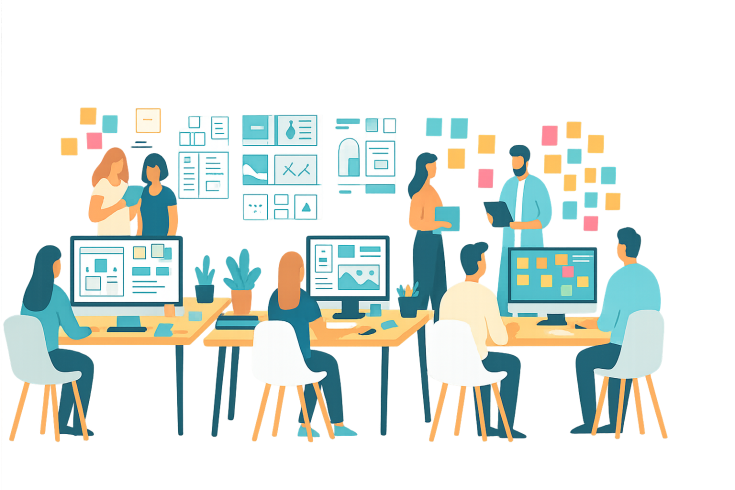Unlocking Business Success: Understand the Differences Between CRM and ERP Systems

Understanding the Differences Between CRM and ERP: Which Program Best Fits Your Business Needs?

When it comes to optimizing your business processes, choosing between a CRM (Customer Relationship Management) system and an ERP (Enterprise Resource Planning) system can be quite the conundrum. Businesses often find themselves asking, “What is CRM for beginners?” or “What is an ERP system in simple terms?” Here’s a simplified breakdown to help you make the right choice.
How does CRM differ from ERP?
At its core, a CRM is primarily focused on managing a companys interactions with both current and potential customers. It helps businesses keep track of their sales leads, customer communications, and marketing campaigns. Think of a CRM as your businesss customer-centric tool. It organizes customer data, sales data, and manages your communication with clients to enhance customer service and satisfaction.
On the flip side, an ERP system integrates various business processes across different departments—from finance to operations, supply chain, project management, and more. This makes it a holistic business tool. If you think of your business as a car, the ERP is like the engine that ensures everything runs smoothly under the hood.
Key functions and benefits of CRM and ERP systems
- ⭐ CRM Benefits:
- Improved customer relationships
- Enhanced sales tracking
- Streamlined communication
- Better customer insights
- ⭐ ERP Benefits:
- Consolidated data management
- Increased operational efficiency
- Real-time analytics and reporting
- Supply chain optimization
What areas does an ERP system cover?
An ERP system encompasses several key areas crucial for any business, including:
| Business Area | Description |
| Finance | Manages accounting, budgets, and financial reports |
| Human Resources | Tracks employee records, payroll, and benefits |
| Supply Chain | Oversees inventory, procurement, and logistics |
| Sales | Administers sales processes and customer data |
| Manufacturing | Helps in managing production schedules and quality control |
| Customer Service | Provides tools for customer support and service |
| Project Management | Aids in planning and tracking project progress |
| Marketing | Manages campaigns and lead generation |
| Compliance | Ensures adherence to industry regulations |
| Reporting | Generates detailed analytics across the business |
According to recent statistics, 63% of organizations have reported a substantial improvement in customer satisfaction after integrating a CRM system, while 80% of businesses utilizing an ERP have noted an increase in operational efficiency.
As for costs, businesses often wonder, “What is the cost of implementing CRM and ERP?” Its vital to note that while CRM implementation can cost between €250 and €4000 depending on features, an ERP might set you back as much as €12000 initially. However, the return on investment is generally promising.
Who should choose CRM versus ERP?
If your primary concern is managing customer relationships and improving sales performance, a CRM is your tool. For instance, a small retail business could benefit tremendously by using a CRM to manage customer interactions and analyze sales trends, leading to more targeted marketing efforts and happy customers. ⭐
On the other hand, if you have a larger organization that requires more complex operations with interlinked processes across various departments, an ERP is indispensable. For example, a manufacturing company needs an ERP to integrate production scheduling with inventory levels, ensuring everything runs smoothly from raw materials to customer orders.
Wondering which program will fit your needs? Our professional specialists at nexrilo.com can help you determine whether CRM or ERP is the perfect solution for your business. We offer a full spectrum of services, from system development to technical support, all in one place. You wont have to reach out to several providers to cover all your IT needs! Contact Ecaterina today at [email protected] or visit nexrilo.com for more information.
⭐ Ready to take your business to the next level? Don’t wait! Call us or sign up online today!
Frequently Asked Questions
- What is the main role of CRM? The main role of CRM is to manage customer interactions and improve relationships.
- What is an ERP system in simple terms? An ERP system integrates various business functions into one complete system to streamline processes.
- What areas does an ERP system cover? ERP covers finance, human resources, supply chain, sales, and more.
- How can I improve customer satisfaction? Using a CRM can provide insights that enhance your customer service.
- What kind of businesses benefit from CRM? Retailers, service providers, and any business reliant on customer relationships benefit greatly.
- How does ERP help in operational efficiency? By consolidating data and automating processes, an ERP can significantly reduce operational time and errors.
- What is the scalability of CRM and ERP systems? Both systems can scale with your business to accommodate growing needs.
- Do I need both CRM and ERP? It depends on your business needs, but many organizations benefit from implementing both systems.
- What are the costs associated with CRM and ERP? Implementation costs vary, typically from €250 for CRM to upwards of €12000 for ERP.
- Can I customize CRM and ERP systems? Yes, most systems allow for significant customization to meet specific business requirements.
How Does CRM Differ from ERP? Unveiling Core Functions and Benefits for Your Business

Understanding how CRM (Customer Relationship Management) systems differ from ERP (Enterprise Resource Planning) solutions is crucial for selecting the right technology for your business. Are you feeling overwhelmed by the options? Don’t worry—we’ll break it down and help you uncover the core functions and benefits of each. ⭐
Core Functions of CRM
The primary function of a CRM system is to manage customer relationships effectively. Here are some key aspects:
- ⭐ Contact Management: Store and manage all customer information in one central location.
- ⭐ Sales Tracking: Monitor your sales pipeline and understand how leads progress through your sales funnel.
- ⭐ Marketing Automation: Automate marketing campaigns based on customer behavior and preferences.
- ⭐ Customer Support: Enable efficient management of customer inquiries and issues through a ticketing system.
For example, a small e-commerce business using a CRM can track customer interactions, analyze buying patterns, and send personalized marketing emails. This can lead to a significant increase in sales—a study found that personalized emails can increase transaction rates by 6 times! ⭐
Key Benefits of CRM
Investing in a CRM system offers several advantages:
- ⭐ Enhanced Customer Relationships: Foster long-term relationships through improved communication.
- ⭐ Better Data Analytics: Utilize customer data to drive informed marketing strategies.
- ⭐ Increased Productivity: Streamline processes and reduce time spent on manual tasks.
- ⭐ Higher Conversion Rates: Convert leads into customers more effectively with targeted communications.
Core Functions of ERP
While a CRM focuses on customer interactions, an ERP system integrates various business processes across the entire organization. Here are some core functions:
- ⭐ Financial Management: Oversee financial operations, including accounting, budgeting, and forecasting.
- ⭐ Supply Chain Management: Manage the flow of goods from suppliers to customers efficiently.
- ⭐ Human Resource Management: Handle employee records, payroll, and performance evaluations.
- ⭐ Project Management: Facilitate planning and execution of projects in real-time.
A manufacturing company, for instance, would benefit significantly from an ERP system by accurately tracking inventory levels, managing supplier contracts, and ensuring timely production schedules—all in real-time. One statistic reveals that companies utilizing ERP systems can reduce their operational costs by up to 15%. ⭐
Key Benefits of ERP
The advantages of deploying an ERP system include:
- ⭐ Integrated Business Processes: Unify all business operations under one roof for better coordination.
- ⭐ Real-time Data Access: Gain insights instantly to make informed decisions.
- ⭐ Improved Efficiency: Automate repetitive tasks, reducing human error and manual workloads.
- ⭐ Compliance and Risk Management: Ensure all departments comply with industry regulations seamlessly.
CRM vs. ERP: Which One Should You Choose?
When deciding between CRM and ERP, consider your business goals:
- ⭐ Choose CRM if: You want to enhance customer relationships, increase sales, and improve customer service.
- ⭐ Choose ERP if: You need to integrate various business functions, improve operational efficiency, and gain a holistic view of your business processes.
At nexrilo.com, we offer tailored solutions to help you determine the most beneficial system for your needs. With 20 years of experience and a team of professional specialists, we can guide you in implementing either CRM or ERP systems that meet your business requirements. Contact us today at [email protected] or visit nexrilo.com for a consultation!
⭐ Ready to get started? Don’t hesitate—give us a call or sign up online today!
Frequently Asked Questions
- What is the main role of CRM? The main role of CRM is to manage customer interactions and improve relationships.
- What is an ERP system in simple terms? An ERP system integrates various business functions into one complete system to streamline processes.
- What areas does an ERP system cover? ERP covers finance, human resources, supply chain, sales, and more.
- How can I improve customer satisfaction? Using a CRM can provide insights that enhance your customer service.
- What kind of businesses benefit from CRM? Retailers, service providers, and any business reliant on customer relationships benefit greatly.
- How does ERP help in operational efficiency? By consolidating data and automating processes, an ERP can significantly reduce operational time and errors.
- What is the scalability of CRM and ERP systems? Both systems can scale with your business to accommodate growing needs.
- Do I need both CRM and ERP? It depends on your business needs, but many organizations benefit from implementing both systems.
- What are the costs associated with CRM and ERP? Implementation costs vary, typically from €250 for CRM to upwards of €12000 for ERP.
- Can I customize CRM and ERP systems? Yes, most systems allow for significant customization to meet specific business requirements.
Fill out the form below and our team will reach out within one business day
